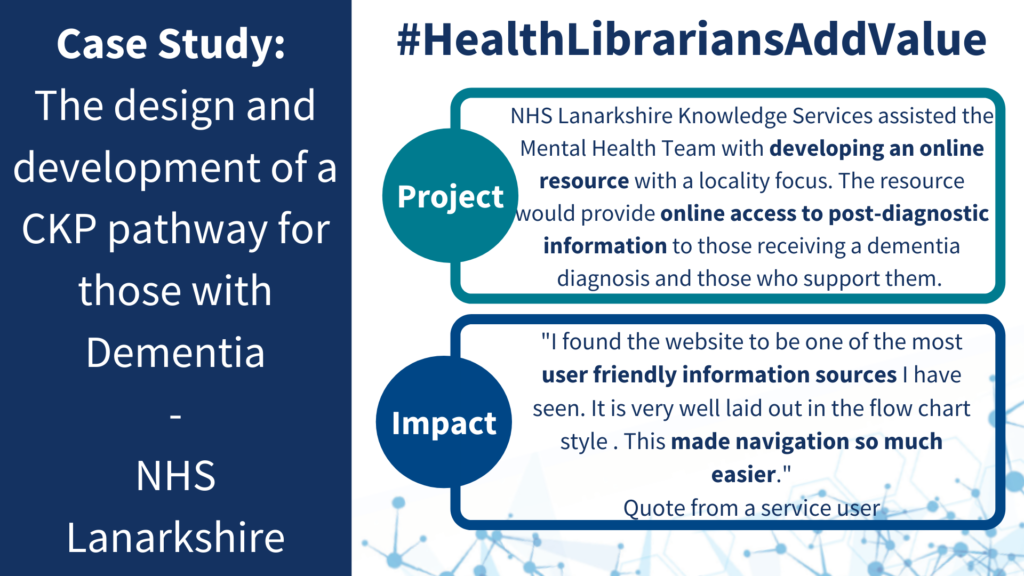The design and development of a CKP pathway for those with Dementia
This case study is part of Health Librarians Add Value, a campaign run jointly by NHS Education for Scotland (NES) and CILIPS. It has been provided by Amanda Minns, Head of Evidence at NHS Lanarkshire (NHSL). Read other case studies here.
Outline of the project
In Scotland, every person diagnosed with dementia is entitled to at least 1 year post-diagnostic support. Traditionally, information is delivered directly by link practitioners. However, this is not without restrictions and issues.
The aim of the project was to address this issue by developing an online resource with a locality focus. The resource would provide online access to post-diagnostic information to those receiving a dementia diagnosis and those who support them. From the beginning, we knew this would need to be a simple and easily accessible resource that patients and carers could use for the information they needed.
The resource would ensure that patients and their carers were given the information they need to assists them to plan throughout the illness.
The Mental Health and Learning Disability Service approached the Evidence Team for help in the design of the resource. The Evidence Team was able to offer a solution in the form of the CKP. The CKP (Clinical Knowledge Publisher) was already well established in NHS Lanarkshire and had been used to design pathways for both patient and clinical use previously. Using an in-house system meant that everything could be designed and updated by local teams, it would be available on the web without the need for additional logins and passwords and there were no additional costs to the health board.
It took around 9 months from the beginning of the project to the launch of the resource. The partnership within the project and the distinct role of both partners was vital for success. Given the nature of the users, it was vital that the design took into account the needs of both patients and their carers. The Mental Health team, as clinical experts, were responsible for gathering the information and linking with the patients/carers to get the initial design out for testing. The evidence team had the experience of design and systems control to ensure the resource would have a consistent design and be user friendly
Impact
It is clear that the resource created during this project is valued to service users. The below quotes show the impact it has had on those receiving a dementia diagnosis and to those who support them
“As a carer for my wife who has dementia I found the information excellent and only wish that when my wife was diagnosed that I had the information on this website to hand. This website will be a great assistance to anyone diagnosed with dementia and also their carers.”
“I found the website to be one of the most user friendly information sources I have seen. It is very well laid out in the flow chart style . This made navigation so much easier.”
Reflecting on the project, Amanda Minns said:
This project was so imprtant because it was focussed on the needs of patients and carers and used an exisiting resource to ensure that all service users were provided with the information they needed once diagnosed.
Demonstrating the value and impact of this work further, those involved in creating the resource have won awards.
- NHS Lanarkshire’s Mental Health and Learning Disability Services & Evidence Team were awarded the Holyrood Connect Digital Health and Care Award in the ‘Accessing Mental Health Care’ category at an awards ceremony held at the Waldorf Astoria, Edinburgh. The award was presented in recognition of its innovative approach to supporting people with mental health problems, improving access to services, and reducing barriers through its dementia post-diagnostic online resource.
- Amanda Minns and Maureen Cossar (Mental Health and Learning Disability Service) developed an NHSL Dementia Post Diagnostic Support pathway which has won the ‘Accessing Mental Health Care’ award at the Digital Heath and Care Awards 2020.’
